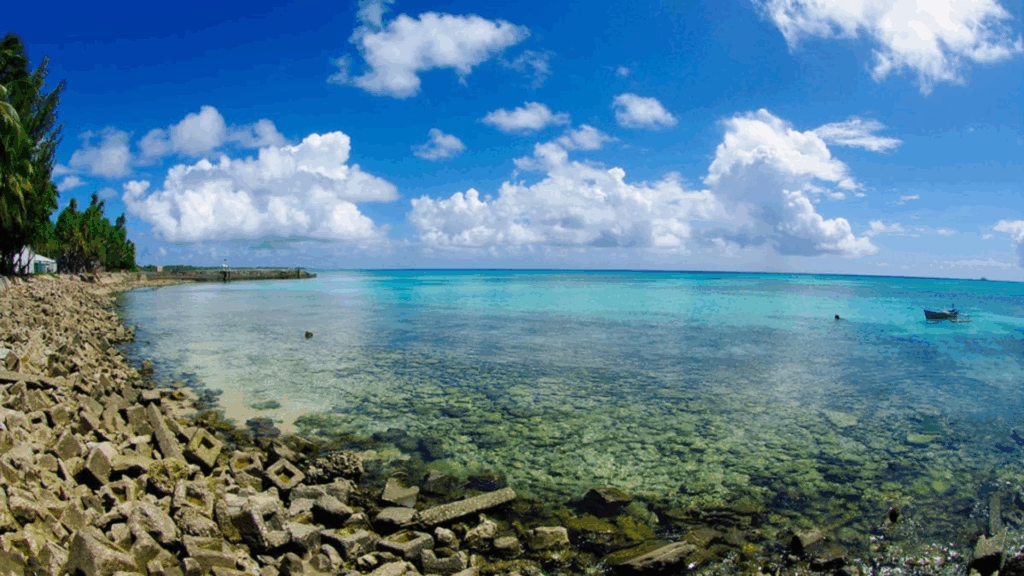
Tuvalu is a remote island nation nestled in the heart of the Pacific Ocean, has long relied on the bounty of its surrounding waters. With its limited landmass and scarce resources, Tuvalu depends heavily on tuna fisheries for food, employment, and revenue.
However, this fragile balance is under severe threat. Climate change, particularly the rise in ocean temperatures is causing migratory tuna species—such as skipjack, yellowfin, and bigeye—to shift eastward, away from Tuvalu’s exclusive economic zone (EEZ).
This trend poses a dire economic and environmental challenge for the country, highlighting the broader vulnerabilities of small island developing states (SIDS) in the face of global warming.
The Vital Role of Tuna for Tuvalu
Tuna fishing contributes over 40% of Tuvalu’s GDP, primarily through fishing license fees paid by foreign fleets operating in its waters. The waters of the central and western Pacific are among the most productive tuna grounds globally, and nations like Tuvalu, Kiribati, and the Marshall Islands have historically benefited from access to these fisheries.
The industry not only provides income for the government but also supports local livelihoods and food security. Fresh tuna is a staple in Tuvaluan diets, and artisanal fishing is a cultural tradition passed down through generations. For a nation with few other resources, tuna is not just an economic asset—it’s a lifeline.
Ocean Warming and Tuna Migration
Scientific studies over the past decade have confirmed that tuna are highly sensitive to ocean temperature. Warming waters affect the distribution of plankton and other organisms in the food chain, which in turn influences where tuna can find food. As temperatures rise, the optimal conditions for tuna, particularly skipjack are gradually moving eastward into the high seas and away from the EEZs of countries like Tuvalu.
According to a 2021 study published in Nature Sustainability, the distribution of tuna is shifting approximately 1,400 kilometers eastward due to ocean warming. By 2050, Tuvalu and its Pacific neighbors could lose up to 20% of their tuna stocks. This shift is not only ecological but also economic: it means that the fish will increasingly be found outside of the jurisdiction of the Pacific island nations, making it harder to regulate, tax, or benefit from these migratory stocks.
Economic Fallout
The exodus of tuna has immediate and tangible implications for Tuvalu’s economy. The government earns tens of millions of dollars annually from licensing agreements under the Parties to the Nauru Agreement (PNA), a cooperative management system for tuna fisheries. These revenues fund essential public services, including healthcare, education, and infrastructure.
If tuna stocks move into international waters or the EEZs of other countries, Tuvalu may lose a significant portion of its revenue base. For a nation already facing existential threats from sea-level rise and saltwater intrusion, this added economic blow could cripple its ability to function effectively.
Moreover, the migration of tuna poses a challenge to Tuvalu’s sovereignty. Fishing rights are one of the few tools the country holds to assert control over its resources. As fish cross borders, the ability to enforce national jurisdiction diminishes, pushing Tuvalu to rely more heavily on international diplomacy and regional cooperation.
Food Security and Cultural Identity at Risk
Beyond economics, the loss of tuna threatens Tuvalu’s food security. Imported food is costly and often less nutritious. A decline in local fish availability could lead to increased dependence on processed and imported goods, exacerbating health issues like diabetes and malnutrition already prevalent in many Pacific island nations.
Fishing is also deeply intertwined with Tuvaluan identity. From traditional canoe-building to communal fishing rituals, marine resources shape both daily life and cultural expressions. As fish migrate away, so too do the traditions tied to them, leading to cultural erosion that cannot be measured in dollars alone.
Regional Implications and Geopolitical Tensions
Tuvalu is not alone in facing this dilemma. Neighboring Pacific nations are similarly affected, and as tuna move into international waters or areas controlled by larger nations like the United States and Japan, competition for access will intensify. This could lead to geopolitical tensions over fishing rights, maritime boundaries, and conservation responsibilities.
The Western and Central Pacific Fisheries Commission (WCPFC), the international body governing tuna management in the region, is under increasing pressure to update its frameworks. There are calls for shifting from static, location-based licensing to dynamic, adaptive systems that follow the fish rather than the lines on a map.
Solutions and Adaptation Strategies
Despite the grim outlook, there are potential solutions. One is the establishment of dynamic fisheries agreements that allow countries like Tuvalu to continue earning revenue even if the fish move out of their traditional waters. This could involve profit-sharing models or mobility-based quota systems within regional coalitions.
Investments in sustainable aquaculture and diversification of the economy are also critical. Tuvalu is exploring options such as tourism, digital services, and renewable energy to reduce dependence on fishing. Moreover, climate finance and international aid—especially from nations with historical responsibility for global emissions—are essential to support adaptation efforts.
Tuvalu has also taken a leadership role on the international stage, advocating for climate justice and the recognition of the climate-induced displacement of both people and resources. In recent years, Tuvalu’s government has explored legal frameworks for preserving its EEZ and sovereignty even if its land territory becomes uninhabitable.
A Wake-Up Call for Global Action
The migration of tuna from Tuvalu’s waters is a powerful reminder that climate change is not a distant threat—it is happening now, and its effects are devastating for the most vulnerable. For Tuvalu, losing tuna means more than just a drop in GDP; it symbolizes the unraveling of an entire way of life.
Addressing this crisis will require a global effort: stronger climate commitments, sustainable fisheries management, and equitable support for those least responsible for climate change but most affected by it. Tuvalu’s struggle should serve as a clarion call for urgent action to protect not just fish stocks, but the future of entire nations.

